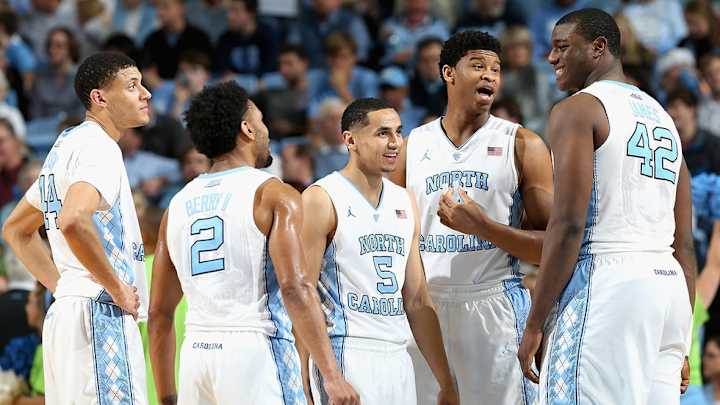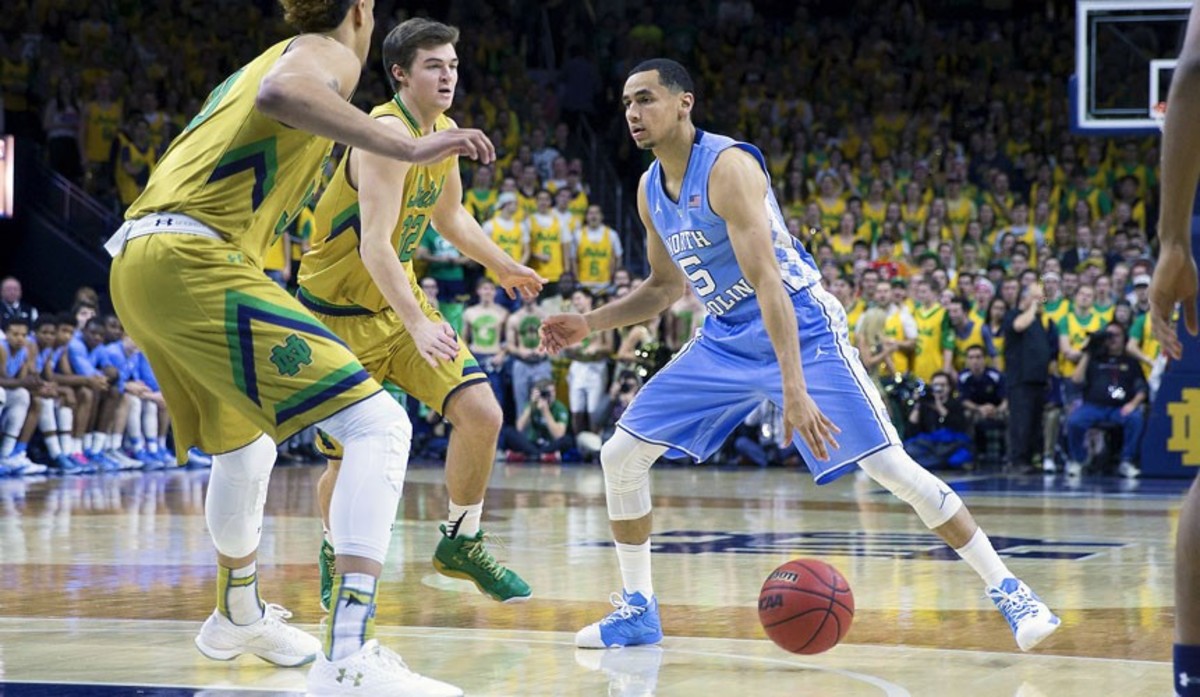Time to Heel: Marcus Paige, North Carolina look for formula to break out of two-game slump

If you think that the shooting slump of a college basketball star results in a lot of advice only for that player, think again: Sometimes the training staff hears it, too. During Marcus Paige's recent six-game stretch of epic struggles from the floor, an email landed with North Carolina's medical people. It suggested they outfit the senior guard with a mouthpiece. Because a mouthpiece would relax entire his body. And that would fix him. Obviously.
Paige likely needed earplugs more than a mouth guard anyway, or at least some sort of online filter from basketball witch doctors. Last Friday, he perused his Twitter feed and received another solution to bust out of the 12-for-57 death spiral (5-for-36 on threes) he'd been in for the previous six games. All Paige had to do, he learned, was shoot with his off-hand in warm-ups three times. Not once or twice, but three times. Alas, the left-handed Paige stuck with his standard routine before facing Notre Dame the next night, and though he did rediscover his stroke, making 5-of-8 three-pointers and 7-of-12 field goal attempts overall en route to scoring 21 points, the Tar Heels lost 80–76 in South Bend.
"None of that stuff makes sense," Paige said afterward. "As a major player at a major university, people care so much that they're going to put their two cents in."
The visitors' locker room was solemn late Saturday, the air thick with an urgency uncommon to 19–4 teams. It was North Carolina's second loss in a row, not exactly Armageddon, so the results alone didn't explain the distress. And the reemergence of Paige's proficiency was worth celebrating at least a bit. The only conclusion to draw was that the Tar Heels never figured that Paige was the problem, but what could be the problem had been thrown in their faces again over the previous two hours.
It is early February and North Carolina is still wondering how tough it is. On Dec. 12, UNC lost 84–82 at Texas despite shooting 52% and committing only six turnovers in part because it gave up 16 offensive rebounds (while securing only four itself), including one that led to Javan Felix's game-winning buzzer-beater. Five days before the loss in South Bend there had been a 71–65 defeat at Louisville in which coach Roy Williams pointed out that the Tar Heels were beaten repeatedly on 50-50 balls and gave up 17 points off offensive rebounds while scoring only seven. And on Saturday Williams watched as Notre Dame—not exactly a squad that rolls into games straight out of a Mad Max: Fury Road convoy—grabbed 20 offensive rebounds and bullied its way to 38 free throw attempts while committing just two turnovers. You can consider it problem not worth any pearl-clutching, or you can consider it a national title contender realizing the only way opponents will regularly hang around is if it lets them.
"For the majority of the games, [Louisville and Notre Dame] dictated things to us and made us play a lot worse than we wanted to," Williams said Monday. "For us, biggest thing is, we have to have more consistency with our effort and more consistency with how we attack people defensively. That's what we're not having. We're allowing people to get too comfortable."

John Mersits/Cal Sport Media via AP Images
The Tar Heels' offensive rebounding percentage of 39.3% ranks seventh nationally according to kenpom.com, which ranks their defensive efficiency 37th best in the country entering Tuesday night's meeting with Boston College. Six of UNC's first eight ACC wins were by double-digits. Basically, the Heels are fine. The talent (six McDonald's All-Americans) and experience (there are no freshmen among their top nine players in minutes) that made them a popular preseason national title pick is still there. And they seem to know how much that talent can separate them in a season when there is little separation between almost anyone. If, that is, they use it intelligently and resolutely.
Take Paige's assessment of his team's effort level, even as it amassed an early 15-point early lead at Notre Dame: "I don't think it was extremely high to begin with ... You can talk about it all day," Paige said. "But inside that 94-by-50, you have to do it. We're going to have to find some combination of guys that are willing to do it the entire game, whether it's five point guards, five centers. We have to find five guys ready to compete for the entire game."
The willingness to do so helped Paige snap out of that six-game funk. "In the first half, he got a couple easy baskets because we were able to play defense, secure the rebounds and get it out fast," sophomore point guard Joel Berry said. "He was able to run down the court and get his feet set. When he gets his feet set, he's a great shooter. I know he hits tough shots coming off ball screens and stuff, but if you let him set his feet, he can knock it down."
The lesson: Defend and rebound, at least with moderate consistency, and your preseason All-America may return to form.
On the other hand, don't do all that and, well …
"It doesn't really matter if (Paige) is making shots if we're losing," senior forward Brice Johnson said.
The truth is as Berry suggested: These things are not mutually exclusive. Reliable defense and rebounding will help an offense that ranks third nationally in adjusted efficiency (119.6 points per 100 possessions) and will also help the team's most dangerous perimeter option. While North Carolina lost just once while Paige struggled to find his stroke, it will require his scoring and playmaking in a difficult finishing kick to the regular-season schedule, which, after Tuesday's game at Boston College, features only one opponent (NC State) currently below. 500 in league play. Paige recognized this, too, though the extent of his self-therapy was mostly to arrive early and stay late for extra shooting to solve his woes, rather than rely on basketball folk remedies.
"Mainly it was sticking to my work habits," he said. "Even if I'm doing a different drill, I'm still working on my game the same, if not more."
If the Notre Dame game provided a release, that was all it did.
"I don't necessarily view it as a turning point or anything," Paige said. "To me, this is the norm. The past five or six games, I haven't been myself, but this is how I expect to play all the time. I just feel like I'm back to my normal self. I don't feel like, 'This is going to carry momentum into the next game.' I just feel like this is how I'm supposed to play every game. This is how I'm going to try to play every game from now on."
A national championship run with Paige shooting 21% from the field and 14% from three-point range would not have been sustainable. But the Tar Heels also seemed aware that the bright spot at the end of that tunnel was in fact a spotlight, shining down on what will be necessary—attention to detail and fundamentals—to maximize their talent and reach the Final Four. They lost that for a short spell, but now they know what they're looking for.
